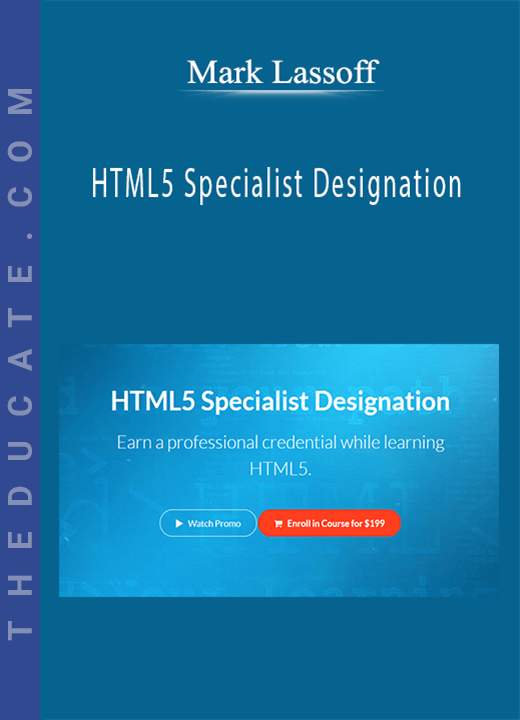Description
Mark Lassoff – HTML5 Specialist Designation
This is Where You Start Your Development Career
HTML5 is the scaffolding that lies beneath almost every contemporary application.
There was a time when only web designers needed to know HTML5 well. However, it’s now a universal skill that every developer needs. Strong HTML5 provides a strong foundation for apps. It also allows you to correctly develop content that appears on web sites, in mobile apps and even digital signage.
How do you learn to create strong HTML5 code that can be easily maintained?
That’s what we’re here to talk about…
FACT: HTML5 is the First Language You Need to Know
(…and an important part of web and mobile developers’ daily work)
We get the question all the time: I want to become a developer, but I don’t know where to start.
We don’t have to sell you on the idea of becoming a developer. If you’re you here, you already know it’s one of the most lucrative (and fastest growing) career tracks out there. It’s HTML5 that allows you to get your foot in the door. HTML5 developers:
- Create the scaffolding for content display for web sites, mobile sites and many mobile applications.
- Mark up web content so it can be distributed across multiple platforms
- Work in large scale digital publishing to create flexible content
- Combine HTML5 skills with other digital skill sets to become web and mobile developers
In other other words, HTML5 development skills are critical to all developers. HTML5 is the foundation to almost any development process.
That’s why business, design studios, development shops and other organizations need HTML5 developers.
But there’s a problem. Most people who learned HTML, learned it in school 12 years ago and have no idea that they’re doing.
That’s how you separate yourself from the pack.
As a Certified HTML5 Specialist, you are qualified to build, maintain and edit HTML5 documents. You’ll be able to help development teams build strong foundations, manage digital content or use HTML5 as a foundation for a strong developer skill set.
In this certification program you will learn:
- How to create a proper HTML5 scaffolding for the type of application that you’re creating. How should HTML5 differ for web and mobile applications?
- How to correctly markup text so that it is sized properly across the variety of screen sizes and densities used by consumers
- How to properly integrate code written in CSS and PHP as external or internal code listings.
- How to select the most efficient tools and environments for HTML5 authoring and testing.
- Understand how to upload content to a web server for public consumption. You’ll also cover how to set up a test server environment locally.
- How to create internal and external links within HTML5 documents.
- Creating Meta Tags that are properly designed for optimal display on Google and other search engines.
- Strategically use HTML5 comments to document your code.
- A unique strategy to use HTML5 comments to debug code and quickly find errors.
- How to create list based content using ordered lists, unordered lists and custom list bullets for custom branding
- How to display images and how to properly optimize images for display on web and mobile devices.
- An infrequently used strategy to boost your Search Engine Optimization value using images
- How to create beautiful information tables that are easy to both create and read
- How to use the hexadecimal color system and apply hexadecimal colors to elements in your HTML5
- How to create usable, functional forms to gather data from your users
- How to secure your forms to avoid security issues with your forms
- How to integrate multimedia elements such as audio, video and animations into your HTML5 content.
- A unique technique for laying out our page that will make complex designs easy to markup and manage
- How to embed iFrame content from outside sources and make it fit seamlessly into your HTML5 page
- A great strategy for correctly converting Photoshop documents to HTML5
- The best HTML5 frameworks to save you time and provide an entry point for new projects
In summary, certified HTML5 specialists are experts who are able to correctly construct rich digital documents that can appear anywhere on the web, mobile or as part of a larger application. They are able to understand how HTML5 fits into the larger context of web and mobile development and work in serious development environments.
So, if you’re interested in starting on the path to professional development:
What’s Stopping You?
(and.. Exactly Why You Might Want to Get Certified)
Honestly, anyone can claim they know HTML5. So how do you separate the talkers from those who are true experts?
Technical skill verification is a huge problem…
We had the same issue here at LearnToProgram. Even though we primarily teach development, we also use development skills everyday on our own digital, online content and apps.
We’re teachers first, but we’re also developers.
We hire people with HTML5 and other web and mobile development skills to be part of our team… which is why we know it’s tough to find truly skilled people who know what they say they know.
That’s why we created not just another HTML5 course, but the HTML5 Specialist Designation.
We built this program so that you can provide verification of your expertise. Anyone can claim to know HTML5, but as a designated HTML5 expert, you can prove it.
How Does the Program Work?
First: Complete the Course
Each of the certification courses includes 5 to 10 hours of video training. Each course also includes lab exercises to help you retain the information in the video lectures. The courses also contain study guides, practice questions and activities- all with one goal: To help you learn new coding skills.
Courses are designed to be completed in a few days, if significant time is invested. However, you may spread the work out for as long as you’d like. There are no calendars or limits on individual courses. Simply work with the course until you’re confident.

Next: Pass the Exam
When you complete the course, you’ll be eligible to sit for the exam. The exams include fifty multiple choice questions with a minimum passing score of 80%. The exams aren’t designed to be difficult, but, to verify that you retained the information in the course. You have up to an hour to complete the exam. However, most people complete the exams much more quickly. If you don’t pass the exam the first time you take it, you may sit for the exam again.
When you pass the exam, and complete the class you have earned your certification or designation. Congratulations!
Receive Your Certificate and Badge
Now that you’re certified, you’ll receive your printable, full color digital certificate. Your certificate will include a link to a digital transcript page which will serve as verification of your achievement. You can place the badge on your personal web site, portfolio or resume. You also can automatically place the badge on your Linked In page.
Many individuals who receive these certifications place them in their email signature and other highly visible digital real estate to set them apart from other developers.
Who should get certified?
Graphic and Digital Designers
Startup Employees
Marketing Designers
Content Specialists
Agency Personnel
Students who want to be more Employable
…Anyone else who wants this critical skill set and proof of expertise
Course Agenda
Module 1: First Steps in HTML5
1.1 Welcome to the Course
1.2 About the Specialist Designation
1.3 About the Instructor
1.4 Quick Start: Making Your First HTML5 Page
1.5 Obtaining the Tools of the Trade
1.6 Learning Basic Document Structure
1.7 Anatomy of a Tag
1.8 Wrap Up Chapter 1
Module 2: Everything You Wanted to Know about Formatted Text
2.1 Welcome to Chapter 2
2.2 Paragraph Tags
2.3 Break Tags
2.4 Preformatted Text
2.5 HTML5 Heading Tags
2.6 Lists
2.7 Quotations & Citations
2.8 Formatting: Bold, Italics and More
2.9 Computer Code
2.10 HTML5 Containers
Module 3: Hyperlinks
3.1 Welcome to Chapter 3
3.2 Creating an Internal Link
3.3 Linking to the Outside World
3.4 The Target Attribute
3.5 Anchors to Navigate Long Pages
Module 4: Digital Media
4.1 Welcome to Chapter 4
4.2 Inserting Images
4.3 Inserting Image Links
4.4 Understanding Image Formats and Size
4.5 Sizing Images Responsively
4.6 Playing and Controlling Audio
4.7 Playing and Controlling Video
Module 5: Displaying Data in Tables and Frames
5.1 Welcome to Chapter 5
5.2 Defining a Table
5.3 Determining the Border of a Table
5.4 Determining Table and Cell Width
5.5 Defining Table Headers
5.6 Spanning Multiple Rows and Columns
5.7 Inserting iFrame Content
5.8 Adding a Table Caption
Module 6: Interacting with the User via Forms
6.1 Welcome to Chapter 6
6.2 Defining the Form
6.3 Text Input
6.4 Limiting Text Input
6.5 Multiple Choice
6.6 Form Submission
6.7 Generic Buttons
6.8 Date Inputs
6.9 Numerical Input
6.10 Organizing a Form with Fieldsets
Module 7: Professional HTML5 Practice
7.1 Welcome to Chapter 7
7.2 Commenting Your Code
7.3 Inserting External Javascript Code
7.4 Meta Tags
7.5 Search Engine Readiness
7.6 It’s a Colorful World
7.7 Identifying HTML5 API’s
7.8 Drawing on Canvas
Module 8: Styling with CSS
8.1 Welcome to Chapter 8
8.2 Where to Style
8.3 CSS Selectors
8.4 Fundamental Typography with CSS
8.5 Understanding the CSS Box Model
8.6 Floating Your Layout
Module 9: Responsive Design Fundamentals
9.1 Welcome to Chapter 9
9.2 Demonstrating Responsive Design
9.3 Using a Responsive Stylesheet
9.4 Responsive Headers
9.6 Creating Your Own Media Queries
Chapter 1: First Steps in HTML5
PreviewWelcome to the Course (2:09)
PreviewAbout Specialist Designation/ Web Development Professional Certification (2:01)
PreviewAbout the Instructor (1:33)
PreviewQuick Start— Making Your First HTML5 Page (9:54)
StartObtain the Tools of the Trade (8:54)
StartLearning Basic Document Structure (6:20)
StartAnatomy of a Tag- The Only Vocabulary You’ll Need (6:28)
StartChapter Lab Video (0:57)
PreviewLab Exercise PDF
StartWrap Up Chapter 1 (1:02)
StartExam Questions for Review
StartChapter Lab Solution
Chapter 2: Everything You Wanted To Know About Formatting Text
StartWelcome to Chapter 2 (1:02)
StartParagraph Tags (2:48)
StartBreak Tags (3:24)
StartPreformatted Text (4:11)
StartHTML5 Heading Tags (3:28)
PreviewLists (6:35)
PreviewQuotations and Citations (3:48)
PreviewFormatting: Bold, Italics and More (5:44)
StartComputer Code (4:27)
StartHTML5 Containers (2:14)
StartChapter Lab Video (1:28)
StartLab Exercise PDF
StartChapter Lab Solution
StartWrap Up Chapter 2 (1:02)
PreviewExam Questions for Review
Chapter 3: Hyperlinks— Connecting Pages and Content
StartWelcome to Chapter 3 (1:27)
StartCreating an internal link (8:16)
StartLinking to the outside world (4:42)
StartThe Target Attribute (3:28)
StartAnchors to Navigate Long Pages (6:51)
StartChapter Lab Video (0:55)
StartLab Exercise PDF
StartChapter Lab Solution
StartWrap Up Chapter 3 (0:53)
StartExam Questions for Review
Chapter 4: Digital Media
StartWelcome to Chapter 4 (1:11)
StartInserting Images (8:54)
StartCreating Image Links (5:23)
PreviewUnderstanding Image and Image Size (1:50)
StartSizing Images Responsively (9:48)
StartPlaying and Controlling Audio (5:09)
StartPlaying and Controlling Video (5:54)
StartChapter Lab Video (1:17)
StartLab PDF
StartChapter Lab Solution
StartWrap Up Chapter 4 (0:56)
StartExam Questions for Review
Chapter 5: Displaying Data in Tables and iFrames
StartWelcome to Chapter 5 (0:57)
StartDefining a Table (5:11)
StartDefining Border of a Table (4:23)
StartDetermining Table and Cell Width (5:52)
StartDefining Table Headers (2:53)
StartSpanning Multiple Rows and Columns (3:33)
StartInserting iFrame Content (4:28)
StartAdding a table caption (2:12)
StartChapter Lab Video (1:29)
StartLab PDF
StartChapter Lab Solution
StartWrap Up Chapter 5 (0:59)
StartExam Questions for Review
Chapter 6: Interacting with the User via Forms
StartWelcome to Chapter 6 (1:08)
StartDefining the Form (4:19)
StartText Input (9:38)
StartLimiting Text Input (8:05)
StartMultiple Choice (10:46)
StartForm Submission (3:18)
StartGeneric Buttons (4:33)
StartDate Inputs (4:41)
StartNumerical Input (3:56)
StartOrganizing a Form with Fieldsets (2:28)
StartChapter Lab Video (1:21)
StartLab PDF
StartChapter Lab Solution
StartWrap Up Chapter 6 (0:52)
StartExam Questions for Review
Chapter 7: Professional HTML5 Practice
StartWelcome to Chapter 7 (1:06)
StartCommenting Your Code (3:33)
StartMeta Tags (5:11)
StartInserting External Javascript Code (5:57)
StartSearch Engine Readiness (5:49)
StartIt’s a Colorful World (8:20)
StartIdentifying HTML5 API’s (2:03)
StartDrawing on Canvas (6:25)
StartWrap Up Chapter 7 (0:36)
StartExam Questions for Review
Chapter 8: Styling with CSS
StartWelcome to Chapter 8 (0:57)
StartWhere to Style… (7:13)
StartCSS Selectors (6:44)
StartFundamental Typography with CSS (7:05)
StartUnderstanding the CSS Box Model (8:56)
StartFloating Your Layout (9:36)
StartChapter Lab Video (0:53)
StartLab PDF
StartChapter Lab Solution
StartWrap Up Chapter 8 (1:00)
StartExam Questions for Review
Chapter 9: Responsive Design Fundamentals
StartWelcome to Chapter 9 (1:12)
StartDemonstrating Responsive Design (3:36)
StartUsing a responsive stylesheet (4:14)
StartResponsive Headers (2:37)
StartChapter Lab Video (1:16)
StartLab PDF
StartChapter Lab Solution
StartWrap Up Chapter 9/ Course Wrap-up (2:04)
HTML5 Exam Study Guide
StartPDF Study Guide







9 reviews for Mark Lassoff – HTML5 Specialist Designation
There are no reviews yet.